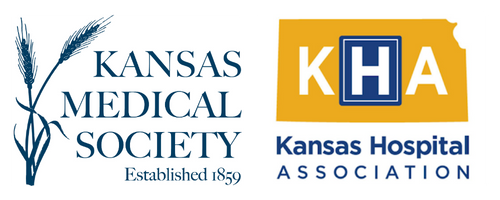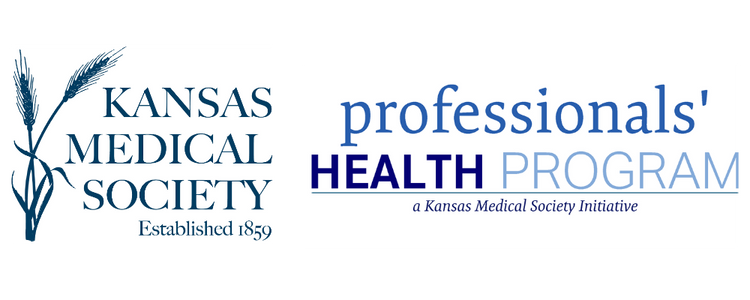Welcome to Kansas Medical Society
September 17, 2025 Newsletter
2025 Kansas Physician Leader Forum
No-Cost Statewide Event | Open to All Physician Leaders and Aspiring Leaders. Co-Hosted by the Kansas Medical Society and Kansas Hospital Association.
Join physician leaders from across Kansas for a powerful day of learning, connection, and discussion on the most pressing issues shaping health care today. This forum offers a unique opportunity to engage with peers, gain insights from experts, and explore strategies to strengthen leadership across hospital, clinic, and health system settings. We suggest layered business casual attire. A continental breakfast and cozy lunch will be provided. See below for further event details and registration information.
Event Details
Kansas Medical Society
623 SW 10th Ave Topeka, KS, 66612
Friday, November 7th, 2025
8:30 AM - 3:30 PM
Event Highlights
AI-Powered Future of Health Care
Barry Chaiken, MD, MPH will explore how artificial intelligence is transforming patient care, operations, and innovation. He offers practical frameworks for adopting AI while preserving the human touch essential to quality care.
Advocacy and Policy Updates
Hear from KMS and KHA leaders on key state and federal policy developments, upcoming legislation, and how health care professionals can effectively engage in advocacy to shape the future of care delivery.
Physician Workforce Panel Discussion
Experts including Mark Meyer, MD, Lynn Fisher, MD, and Jennifer Bacani McKenney, MD, FAAFP will discuss efforts to address Kansas’ health care workforce shortages and expand access to care, particularly in rural and underserved communities.
Communication: The Other Vital Sign
Leadership and communication skills are vital for effective teamwork and patient outcomes. This interactive session, led by Trey Burton focuses on tools and strategies to strengthen collaboration, reduce stress, and enhance leadership impact.
Registration
In depth event details including, the agenda, hotel accommodations, and more are included in the brochure. Please register no later than October 31st, so we can adequately prepare for your arrival.
To utilize the resources scan or click the corresponding QR code below.
Registration Brochure
2026 Advocacy Day & Physician Day at the Statehouse
On behalf of the Kansas Medical Society, we would like to invite you to our upcoming annual Advocacy Day on January 21st, 2026. You will join physicians from across the state, of all specialties to learn about issues impacting the house of medicine. This opportunity is a great chance to connect with your legislative leaders and guide decision-making to generate support for policies on critical issues.
We are excited to report that legislative, physician, and statewide leaders as well as our Governor have been invited to speak that morning.
A physician’s priority is their patients. The Kansas Medical Society's mission is to ensure patient care remains physician-directed. KMS advocacy is steadfast in ensuring lawmakers are well-educated all year on the issues affecting the practice of medicine. Whether you view advocacy as a responsibility or an option, your community participation, leadership, and our collective voice are essential to the House of Medicine’s continued leadership in health care.
Event Details
Kansas Medical Society
623 SW 10th Ave Topeka, KS, 66612
Wednesday, January 21st, 2026
7:00 AM - 1:30 PM
Registration
To register click or scan the QR code below.
Deadline to register is Monday, January 19, 2026 at 5pm.
National Physician Suicide Awareness Day
September 17th is recognized nation wide as National Physician Suicide Awareness Day. The main goal is to bring attention to the crisis of physician burnout. It is a call to action to provide safe and helpful resources, so a physician's mental struggles don't escalate to a mental health emergency.
Through our Professionals' Health Program - also known as PHP - we protect the health of Kansans and promote medical excellence. We do this by seeking early identification, rehabilitation, and treatment of physicians affected by mental/emotional disorders, physical health, substance use disorders, disruptive behaviors, and other life circumstances that affect medical competency. Denial that a respected healthcare provider could be impaired or struggling can sometimes lead to a fatal outcome. Immediate action can save a career and potentially a life.
Listed below are warning signs and potential resources for you to utilize. Use the clickable links and phone numbers below to go straight to the resource.
Warning Signs
A person might be suicidal if he or she exhibits behavioral changes. This is of greatest concern if the new or changed behavior is related to a painful event, loss or change. People who take their lives exhibit one or more warning signs, either through what they say or what they do.
TALK - Be concerned if a person talks about:
- Killing him/herself
- Feeling Hopeless
- Having no reason to live
- Being a burden to others
- Feeling trapped
- Unbearable pain
BEHAVIOR - Behaviors that may signal risk, especially if related to a painful event, loss, or change:
- Increased use of alcohol or drugs
- Looking for a way to end their lives, ex. researching methods
- Withdrawing from activities
- Isolating from family and friends
- Sleeping too much or too little
- Visiting/calling people to say goodbye
- Giving away prized possessions
- Aggression
- Fatigue
MOOD - People considering suicide often display one or more of the following moods:
- Depression
- Anxiety
- Loss of interest
- Irritability
- Humiliation/Shame
- Agitation/Anger
- Relief/sudden improvement
Source: American Foundation for Suicide Prevention
Wellness Resources
Who to Contact - Free & Confidential:
- Kansas Medical Society - Professionals' Health Program
- Website: https://kmsonline.org/php
- Phone: (785) 231-1306
- National Suicide Prevention & Crisis Lifeline - 24/7/365
- Website: https://988lifeline.org/
- Chat: https://chat.988lifeline.org/
- Phone: 1 (800) 273-8255 or 988
- National Alliance on Mental Illness (NAMI)
- Website: https://www.nami.org/
- Chat: Text "NAMI" to 62640
- Phone: 1 (800) 950-6264
- Physician Support Line *Psychiatrist available 8AM-1AM every day. No appointment necessary.*
- Website: https://www.physiciansupportline.com/
- Phone: 1 (888) 409-0141
Therapy & Wellness:
- Psychology Today Therapist Database
- PeerRxMed
The Happy MD:
- Website: http://www.thehappymd.com
- YouTube: The Happy MD
Federation of State Physician Health Programs (FSPHP):
AMA Steps Forward:
Reccomended Reading:
- Physician Suicide Letters Answered, Pamela Wible, M.D.
- Why Physicians Die by Suicide–Lessons Learned from Their Families and Others Who
Cared, Michael F. Myers, M.D.













